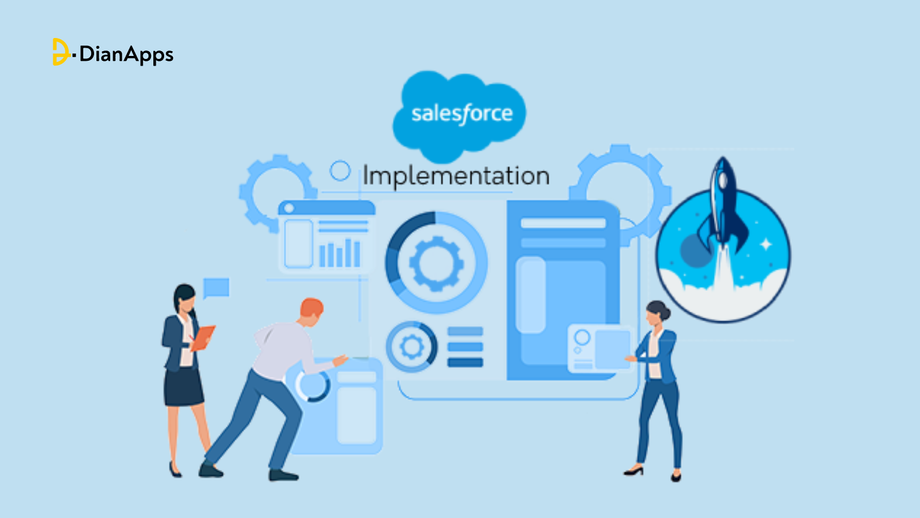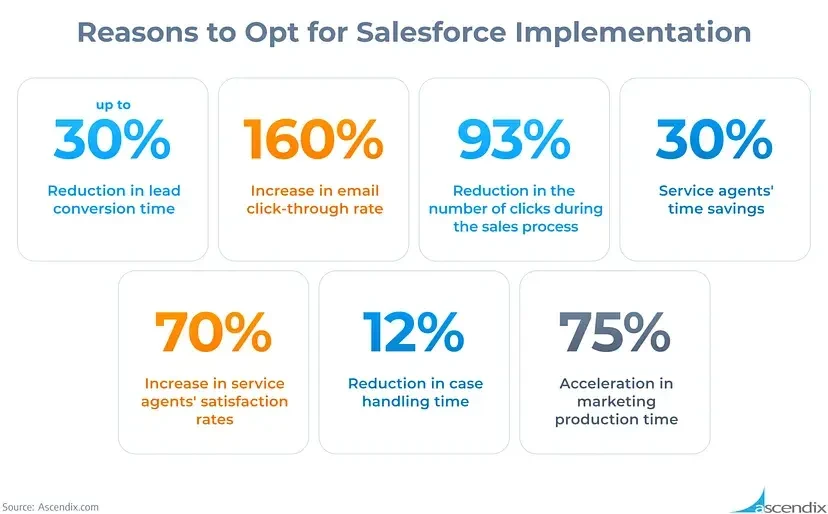Importance of Salesforce Implementation Services in 2024
Salesforce CRM is widely recognized for its effectiveness in enhancing business performance, regardless of company size. According to a report from Salesforce itself, It has boosted a market share of 23.0%.
Implementing Salesforce CRM has resulted in significant improvements for businesses, including increased lead conversions, higher customer retention rates, enhanced online revenue, and improved customer satisfaction.
Many global organizations such as Toyota, Spotify, Canon, and various other companies have already trusted and implemented Salesforce for optimizing their business processes.
With the right guidance and support, any business can implement Salesforce CRM successfully and achieve similar benefits. Why? The reason is the increasing preference for Salesforce solutions lies in its successful implementation results.
For your information, a well-executed Salesforce implementation can result in a rise in an average revenue increase of 37% and boost productivity by 44%.
If you’re also considering Salesforce implementation, this article has all the answers to your questions. It outlines what Salesforce implementation means, the importance of successful Salesforce implementation, the associated costs, and the crucial steps on how to prepare for successful Salesforce implementation.
What is Salesforce Implementation?
When a company implements a Salesforce system, it integrates a core CRM (Customer Relationship Management) platform to centralize its essential business communication and activities. This process involves various services such as consulting, configuration, migration, customization, integration, and support provided by a full-service Salesforce implementation company. The aim is to enhance customer service, sales, and marketing processes.
To ensure success, several steps must be followed:
- Firstly, the company must define its vision and objectives for the Salesforce implementation.
- Then, it needs to set up the system by configuring permissions, importing data, and adding customizations.
- Thorough training for all employees is crucial before the system goes live.
- Additionally, if the organization finds the CRM system easy to use, it can gradually introduce more functionality based on its specific needs.
It's essential to understand the company's CRM requirements thoroughly before starting the Salesforce CRM implementation to ensure a successful outcome.
Why Should You Implement Salesforce?
Advantages of Salesforce Implementation Services
Implementing Salesforce services is crucial due to the platform's triannual updates, ensuring it remains reliable and up-to-date. These updates enhance system performance and introduce new features, necessitating continuous adaptation. Here's why investing in Salesforce implementation services is beneficial:
1. Rapid Business Operations
Salesforce automation streamlines tasks like client identification and meeting scheduling, expediting processes from lead generation to final orders. Automation boosts efficiency, enabling faster decision-making and order fulfillment.
2. Employee Satisfaction
Salesforce's goal-setting and tracking features empower users to visualize their sales pipeline and monitor progress. This transparency fosters accountability and motivates employees to achieve targets, enhancing overall job satisfaction.
3. Lead Management
Salesforce automates lead conversions, notifying sales teams of new leads generated through various channels. This streamlines lead nurturing and ensures timely follow-ups, maximizing conversion rates and revenue.
4. Business Functionality
Effective Salesforce implementation improves business functionality by centralizing customer data, providing robust reporting tools, and facilitating seamless integration across departments. Its versatility allows access from any device, enhancing accessibility and collaboration.
How to Prepare for Salesforce Implementation?
1. Gather Business Stakeholders to Identify Key Objectives and Challenges
Bring together teams and individuals from various departments to discuss the needs for CRM implementation. Understand internal hurdles to set realistic expectations for the solution. Identify daily challenges faced by employees at all levels to prioritize objectives and establish attainable system goals.
2. Document All Internal Processes and Daily Operations
Take the time to comprehend the daily tasks and workflows of your teams. Encourage each department to document their processes and identify areas for improvement. This helps in optimizing processes and streamlining operations across the organization.
3. Set Project Timeline and Budget Parameters
Ensure that the Salesforce project aligns with other major initiatives to prevent resource conflicts. Define the project timeline, including rollout phases, testing, and kickoff meetings. Align essential needs and expectations with a preliminary budget estimate, considering consulting experienced Salesforce advisors for precise projections.
4. Create Multiple Project Outcome Scenarios
Consider factors like company size, data volume, and customization needs when estimating the Salesforce project. Devise optimistic, pessimistic, and most likely scenarios to anticipate risks and unexpected outcomes.
5. Establish Key Performance Indicators for Success
Set measurable goals and metrics to evaluate the success of the Salesforce implementation plan. This could include objectives such as reducing case resolution time or increasing lead flow. Precise metrics facilitate tracking progress and making strategic adjustments.
6. Set Up Communication Channels and Strategy
Effective communication among implementers, stakeholders, and internal teams is crucial for successful CRM deployment and adoption. Establish clear and consistent channels for collaboration to ensure everyone stays informed and aligned throughout the implementation process.
7. Identify Project Stakeholders and Their Roles
Assign key roles in the Salesforce implementation process, including senior management, CRM users, sales, service, marketing teams, channel partners, and customers. Identify primary stakeholders, internal overseers, and technical resources to ensure project preparedness and smooth execution.
8. Analyze Source Data for Insights
Prioritize data accuracy and cleanliness before importing it into Salesforce. Establish policies for naming conventions and data deduplication to streamline the import process and prevent errors.
9. Develop a Change Management Strategy
Create a comprehensive change management plan to address organizational changes before, during, and after the Salesforce implementation. This ensures a smooth transition and ongoing adoption of the new CRM system.
10. Familiarize Yourself with the Salesforce Ecosystem and User Interface
Gain a thorough understanding of Salesforce's appearance, usability, and structure to manage expectations and facilitate the adaptation of business processes to the new platform. This familiarity helps in leveraging the full capabilities of Salesforce and maximizing its benefits for your organization.
Tips for Successful Salesforce Implementation
1. Clear Requirements
Clearly define and document project requirements to avoid discrepancies between expectations and reality during implementation. Clarity in requirements minimizes the chances of misunderstandings and ensures smoother execution.
2. Stakeholder Involvement
Engage stakeholders early in the process to gain their buy-in and encourage active participation. Their input and feedback are invaluable for refining the solution and aligning it with business objectives, increasing the likelihood of successful implementation.
3. Time Commitments
Establish clear time commitments from both business stakeholders and end users. Involve them throughout the implementation process to ensure their needs and expectations are met. Continuous involvement prevents deviations from the initial vision and fosters collaboration between technical and business teams.
4. Thorough Testing
Prioritize thorough testing at every stage of implementation to identify and rectify potential issues before they escalate. Rigorous testing ensures the functionality of the solution aligns with defined requirements, minimizing the risk of errors or setbacks during demonstrations or training sessions.
Cost of Salesforce Implementation Services
The cost of Salesforce Implementation services starts somewhere around $5,000 and goes high on the basis of various factors like
- Project scope and complexity,
- Selected products and editions,
- Quantity and cost of licenses,
- Number and cost of integrations,
- CRM consulting expenses,
- Data migration costs,
- Customization charges,
- Training expenses,
- Post-launch support costs.
Conclusion
While wrapping up, we hope you find this article helpful in making a well-informed decision on Salesforce implementation. We have noticed that implementing Salesforce in your business will take your venture a level ahead, so why to wait? Hire a Salesforce consulting company and be set to jump on the bandwagon in 2024.
Alternatively, you can connect with experts and get guidance on how to make the best out of the Salesforce implementation solutions and expand your business seamlessly.
Article Source: https://medium.com/@marketing_96275/importance-of-salesforce-implementation-services-in-2024-b71153c9d490


Comments
Post a Comment